The flexible packaging market is estimated to be valued at USD 332.7 billion in 2025 and is projected to reach USD 552.3 billion by 2035, registering a compound annual growth rate (CAGR) of 5.2% over the forecast period.
This steady expansion highlights the rising adoption of lightweight, versatile, and cost-effective packaging formats across food, beverage, pharmaceutical, and personal care industries.
The growth trajectory is supported by the increasing preference for pouch formats, sachets, wraps, and films that optimize storage and transportation. Flexible packaging is gaining share as it enables extended product shelf life, reduces material use compared to rigid formats, and supports the trend toward convenience-driven consumer behavior. Emerging economies are witnessing accelerated uptake due to expanding retail distribution and the shift from unpackaged to branded goods.
The period from 2025 to 2035 is expected to bring a gradual shift toward recyclable and mono-material solutions, encouraged by regulatory frameworks and brand-owner commitments. Digital printing and customization are also enhancing brand engagement, while e-commerce logistics drive demand for durable yet lightweight packaging options.
Converting operations require precision web handling systems, multi-station printing capabilities, and lamination processes that create barrier structures optimized for specific product requirements including oxygen transmission rates, moisture vapor barriers, and puncture resistance specifications.
Production planning coordinates between film suppliers, ink manufacturers, and adhesive providers to establish material specifications that accommodate high-speed converting equipment while maintaining consistent quality across extended production runs. Equipment procurement involves analyzing line speeds, waste generation rates, and changeover efficiency when specifying gravure printing presses, solventless laminators, and slitting equipment for multi-substrate flexible packaging production.
Quality assurance protocols address registration accuracy, color consistency, and bond strength testing that validate package integrity throughout distribution stress conditions and consumer handling requirements. Cross-functional coordination involves packaging engineers, brand managers, and operations teams collaborating to optimize package designs that balance cost reduction objectives with shelf appeal requirements and functional performance specifications.
Material waste reduction initiatives focus on optimizing substrate yields, minimizing setup waste during job changeovers, and developing recyclable structures that support corporate sustainability commitments while meeting regulatory requirements for food contact applications.
Technology advancement emphasizes digital printing capabilities, intelligent packaging features, and barrier coating technologies that eliminate traditional lamination steps while maintaining performance characteristics. Printing press manufacturers develop hybrid systems combining conventional and digital technologies that accommodate short-run production requirements and variable data printing applications including QR codes, batch tracking, and promotional campaigns. Coating applications replace aluminum foil barriers with transparent alternatives that maintain product visibility while providing equivalent moisture and oxygen protection properties.
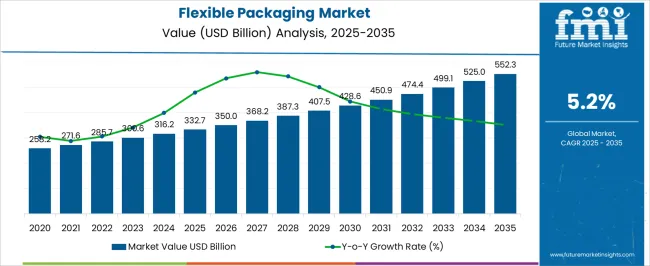
| Metric | Value |
|---|---|
| Flexible Packaging Market Estimated Value in (2025 E) | USD 332.7 billion |
| Flexible Packaging Market Forecast Value in (2035 F) | USD 552.3 billion |
| Forecast CAGR (2025 to 2035) | 5.2% |
The flexible packaging market is expanding rapidly, propelled by increasing demand for convenient and sustainable packaging solutions across multiple industries. The food and beverage sector has been a major driver of this growth, due to rising consumer preference for on-the-go and resealable packaging options that maintain product freshness.
Advancements in material science have enabled the development of lighter and more durable films that reduce packaging waste and enhance shelf life. Regulatory focus on sustainability and waste reduction is encouraging manufacturers to adopt recyclable and biodegradable materials.
The growing popularity of e-commerce and direct-to-consumer models is also fueling the need for flexible packaging formats that offer protection during shipping and easy disposal. Market expansion is expected to be led by polyethylene as a preferred material for its versatility and cost-effectiveness, pillow pouches due to their convenience and space-saving design, and the food and beverage industry as the largest application segment.
The flexible packaging market is segmented by material, product, application, and geographic regions. By material, the flexible packaging market is divided into Polyethylene, Polyester, Polystyrene, Polypropylene, Paper, Aluminum, and Cellulosic. In terms of the product, the flexible packaging market is classified into Pillow pouches, Stand-up Pouches, four-side seal pouches, and Others.
The flexible packaging market is segmented into Food & beverage, Personal care, Healthcare, Industrial, and Others. Regionally, the flexible packaging industry is classified into North America, Latin America, Western Europe, Eastern Europe, Balkan & Baltic Countries, Russia & Belarus, Central Asia, East Asia, South Asia & Pacific, and the Middle East & Africa.
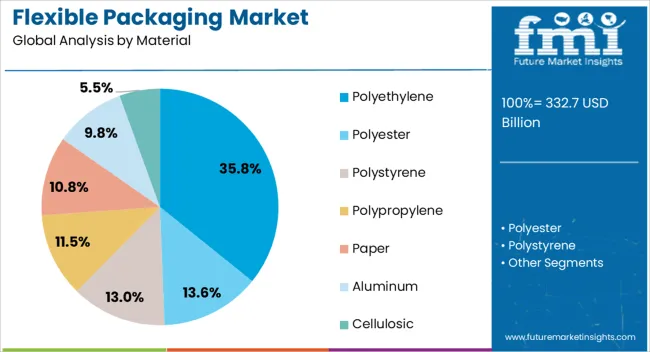
The polyethylene segment is anticipated to hold 35.8% of the flexible packaging market revenue in 2025, making it the dominant material choice. Its growth can be attributed to polyethylene’s excellent moisture barrier properties, flexibility, and low cost.
These qualities have made polyethylene ideal for packaging a wide range of products, especially in the food and beverage sector, where protection from moisture and contaminants is crucial. Manufacturers favor polyethylene for its ease of processing and compatibility with printing and sealing technologies.
Its recyclability and the availability of bio-based polyethylene options are also enhancing its appeal amid increasing environmental concerns. Given these factors polyethylene is expected to maintain a strong market position.
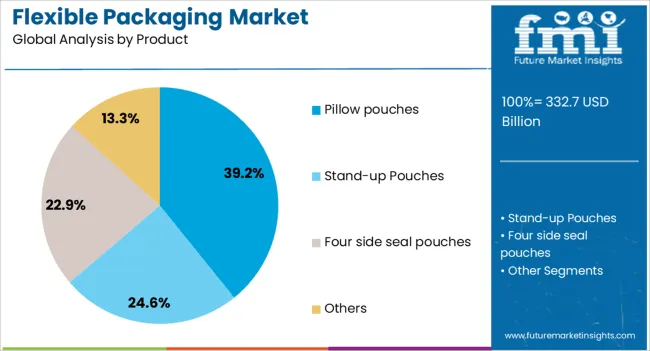
The pillow pouches segment is expected to contribute 39.2% of the market revenue in 2025, reflecting strong demand for this packaging format. Pillow pouches are appreciated for their lightweight design and efficient use of shelf space, which benefits both retailers and consumers.
Their simple construction allows for cost-effective manufacturing and easy customization, making them a preferred choice for food products such as snacks, confectionery, and pet food.
The convenience of resealable options and the ability to accommodate various filling technologies have further supported their adoption. As consumer preference shifts toward packaging that combines functionality with sustainability, pillow pouches are positioned to remain a key product segment.
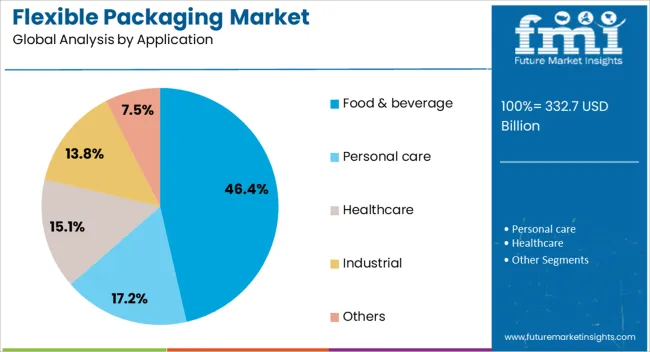
The food and beverage application segment is projected to account for 46.4% of the flexible packaging market revenue in 2025, holding the largest share. The growth in this segment is driven by increasing demand for packaged foods that offer extended shelf life, portion control, and convenience.
Flexible packaging solutions meet these needs by providing effective barriers against oxygen, moisture, and contaminants, preserving product quality. The expanding variety of ready-to-eat and on-the-go food products has also stimulated demand.
Retailers and manufacturers are investing in flexible packaging to attract consumers with visually appealing designs and easy-to-open features. Additionally, heightened consumer awareness about food safety and hygiene has reinforced the need for reliable packaging. As the food and beverage industry continues to innovate, flexible packaging will play an integral role in meeting evolving consumer expectations.
Flexible packaging continues to dominate due to its adaptability, lightweight design, and efficiency across industries. Its evolution has been reinforced by e-commerce expansion, material innovations, and strategic moves by global producers.
Flexible packaging has gained traction as a preferred choice due to its lightweight nature, ease of storage, and consumer-friendly formats such as pouches, sachets, and resealable packs. This shift is driven by the growing importance of portability and portion control, especially in food and beverage segments where ready-to-eat and single-serve packaging has expanded significantly. Convenience also plays a decisive role in influencing purchasing decisions across cosmetics, personal care, and household product categories. Its adaptability in design and ability to extend product shelf life further strengthen its adoption. These features position flexible packaging as a versatile solution, accommodating diverse product requirements and consumer expectations in both developed and emerging markets.
The rapid adoption of e-commerce has bolstered demand for flexible packaging formats that offer durability and protection during shipping. Lightweight materials lower transportation costs while ensuring damage resistance, making them suitable for direct-to-consumer delivery models. Pouches, mailer bags, and stand-up packs have emerged as highly effective in balancing cost efficiency with performance. Companies are adopting flexible solutions to address rising consumer expectations for secure and visually appealing deliveries. The adaptability of flexible packaging allows brands to optimize branding while maintaining logistics efficiency. As online retail continues to dominate product distribution strategies, this segment has become a core revenue driver, reinforcing flexible packaging as a dominant format across diverse industries.
High-barrier films and mono-material laminates have reshaped flexible packaging by enhancing performance in terms of product protection, shelf stability, and recyclability. Developments in material formulations have enabled packaging to resist moisture, oxygen, and light exposure, critical for sectors like pharmaceuticals, snacks, and beverages. Brands have increasingly adopted smart packaging technologies, such as freshness indicators and QR-coded designs, to provide product authentication and consumer engagement opportunities. This wave of innovation has strengthened competitive differentiation for producers, enabling premium positioning in highly competitive markets. Flexible packaging now plays a central role in bridging product protection with brand experience, setting new standards across retail categories and healthcare applications.
Global producers in flexible packaging emphasize strategic mergers, acquisitions, and portfolio diversification to expand reach and secure stronger market positions. Manufacturers are focusing on capacity expansions, collaborations with FMCG companies, and entry into high-demand sectors like nutraceuticals and medical supplies. Partnerships with retailers and brand owners ensure greater adoption of customized formats that cater to specific distribution channels. Competitive dynamics have also been influenced by fluctuating raw material prices, prompting companies to explore alternative sources and optimize operational costs. By leveraging design innovations, marketing strategies, and wider product offerings, flexible packaging leaders are shaping an increasingly consolidated yet diversified industry landscape across international markets.
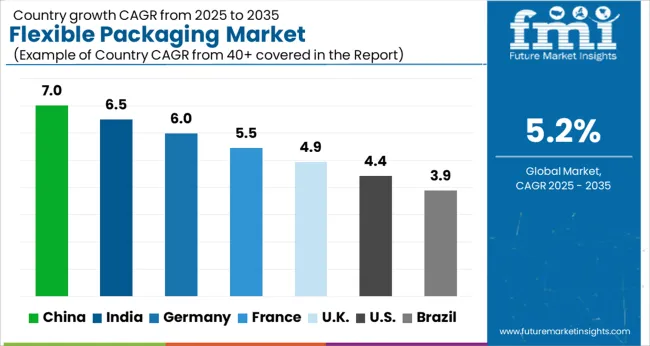
The flexible packaging industry is projected to expand globally at a CAGR of 5.2% from 2025 to 2035, supported by demand in food, beverage, personal care, and healthcare applications. China leads with a CAGR of 7.0%, driven by mass adoption in packaged food, pharmaceuticals, and widespread retail penetration that continues to reshape supply chains. India follows at 6.5%, supported by a large consumer base, growth in FMCG sectors, and rising demand for lightweight, portable formats in both rural and urban markets. France posts 5.5%, influenced by bakery, dairy, and wine packaging demand, supported by strong retail distribution.
The United Kingdom shows 4.9%, boosted by e-commerce adoption, online grocery delivery, and preference for portion-controlled packaging. The United States records 4.4%, shaped by mature retail structures and increased consumption of flexible pouches in snacks, beverages, and pet food categories. The analysis covers more than 40 countries, with these leading regions shaping material preferences, consumer adoption, and supplier positioning in the evolving flexible packaging landscape.
The CAGR of the China flexible packaging market averaged 6.2% during 2020-2024 and is expected to accelerate to 7.0% in 2025-2035, outpacing most mature packaging markets. Early growth was shaped by rapid adoption of pouch and sachet formats in snacks, dairy, and ready meals, supported by organized retail expansion and strong FMCG penetration. In the coming years, higher CAGR is projected as converters invest in high-barrier laminates, mono-material designs, and improved printing capabilities to meet brand refresh cycles. Logistics cost reduction through lightweight packaging and the shift to e-commerce grocery has reinforced demand. Tier I and Tier II cities continue to be at the forefront of this transition, making China a critical growth hub.
India’s flexible packaging market recorded a CAGR of 5.9% between 2020 and 2024 and is projected to climb to 6.5% in 2025-2035. The earlier phase was influenced by FMCG expansion in tier II and tier III towns with sachets dominating personal care and food categories. Going forward, higher CAGR is supported by growth in cold-chain ready formats, adoption in medical supplies, and expansion of e-commerce grocery. Domestic converters are investing in multilayer extrusion lines and digital printing facilities, creating capacity for faster turnaround. Pouches for beverages, nutraceuticals, and snacks are gaining stronger visibility across retail and online platforms. India’s scale advantage coupled with rising demand for affordable packaging formats ensures steady momentum in the next phase.
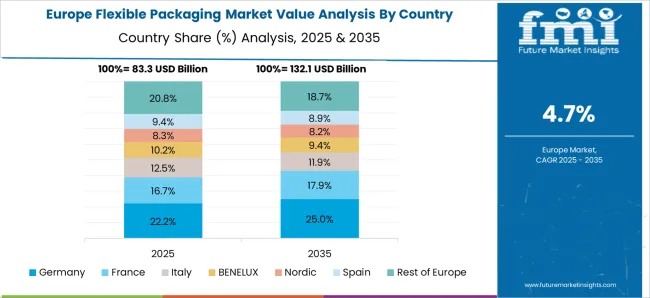
The CAGR of the France flexible packaging market averaged 4.8% during 2020-2024 and is projected to improve to 5.5% in 2025-2035. Initial growth was linked to demand in bakery, dairy, and chilled foods, where portion-controlled packs gained acceptance. Looking ahead, higher CAGR will be driven by packaging differentiation in private label categories and adoption of tactile finishes and reclose features. Converters are developing short-run, digitally printed films that cater to seasonal promotions and gourmet product launches. Premiumization in food and beverage categories has kept flexible packaging at the center of supermarket strategies. Growth is further reinforced by rising adoption in cosmetics and dermo-care travel packs, opening up new commercial opportunities.
The CAGR of the UK flexible packaging market averaged 3.4% during 2020-2024 and is projected to rise to 4.9% in 2025-2035, a step-up from the earlier phase. Lower growth in the initial period was shaped by inflation shocks, delayed converter investments, and retailer-driven SKU rationalization. The acceleration is expected as online grocery stabilizes, healthcare pouches expand, and quick-commerce platforms integrate lightweight mailers into operations. Retailers are introducing premium private label ranges with advanced print features that add shelf value. Converter expansions in coating and lamination capacity will help reduce imports and increase domestic availability. This shift ensures that the UK packaging sector gains resilience, strengthening long-run competitive positioning in Europe.
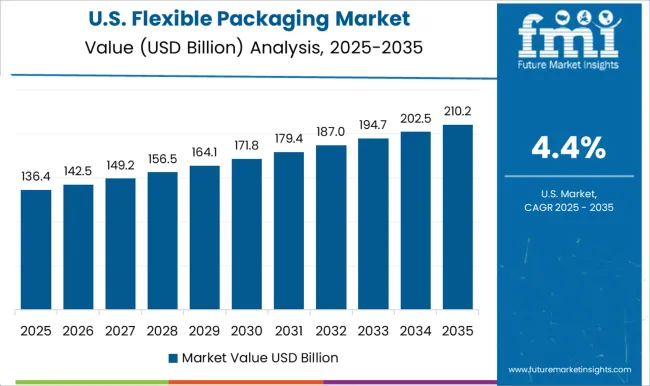
The CAGR of the US flexible packaging market averaged 3.9% during 2020-2024 and is expected to climb modestly to 4.4% in 2025-2035. Initial demand was shaped by steady conversions from rigid to flexible formats in snacks, beverages, and pet food, especially in mass and club channels. The rise in CAGR is expected as spouted beverage pouches, reclose features in club packs, and DTC mailer bags gain ground. Co-packing networks across multiple states have scaled production capacity, reducing turnaround times for emerging brands. Short-run digital printing has enabled faster retail launches, which encourages innovation in packaging design. Growth is supported by rising adoption of flexible formats in pet care, sports hydration, and health-conscious snacking categories.
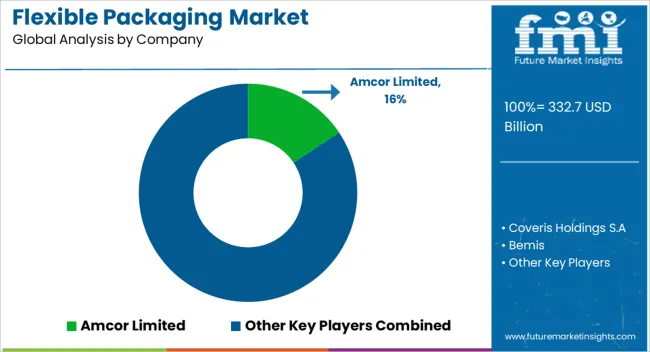
The flexible packaging market is rapidly expanding, driven by consumer demand for sustainable, cost-effective, and versatile packaging solutions across various industries, including food and beverage, pharmaceuticals, and personal care. Key players in the market include Amcor plc, Coveris Holdings S.A., ProAmpac, ExxonMobil Chemical, Constantia Flexibles, Sonoco Products, Mondi Group, Sealed Air, Cellpack Packaging, Berry Global, Südpack Verpackungen, Clondalkin Group, Wipak Group, Bischof + Klein, ACTEGA GmbH, Goglio Group, AR Packaging, Schur Flexibles, and Flair Flexible Packaging.
Amcor plc leads with innovative, sustainable flexible packaging solutions, offering recyclable and eco-friendly options. ProAmpac and Coveris specialize in multi-layer flexible films, providing customizable solutions for food and consumer goods packaging. ExxonMobil Chemical and Constantia Flexibles focus on high-performance films that extend shelf life and ensure product protection.
Sonoco Products and Mondi Group deliver sustainable packaging innovations, with a focus on biodegradability and recyclability. Sealed Air offers protective packaging for sensitive products, while Berry Global and Südpack cater to the growing demand for eco-conscious, high-performance packaging. ACTEGA GmbH and Goglio Group offer barrier coatings and packaging solutions for the food and beverage sectors.
| Item | Value |
|---|---|
| Quantitative Units | USD 332.7 Billion |
| Material | Polyethylene, Polyester, Polystyrene, Polypropylene, Paper, Aluminum, and Cellulosic |
| Product | Pillow pouches, Stand-up Pouches, Four side seal pouches, and Others |
| Application | Food & beverage, Personal care, Healthcare, Industrial, and Others |
| Regions Covered | North America, Europe, Asia-Pacific, Latin America, Middle East & Africa |
| Country Covered | United States, Canada, Germany, France, United Kingdom, China, Japan, India, Brazil, South Africa |
| Key Companies Profiled | Amcor plc; Coveris Holdings S.A.; ProAmpac; ExxonMobil Chemical; Constantia Flexibles Group GmbH; Sonoco Products Company; Mondi Group; Sealed Air Corporation; Cellpack Packaging; Berry Global Group Inc.; Südpack Verpackungen GmbH & Co. KG; Clondalkin Group Holdings B.V.; Wipak Group; Bischof + Klein SE & Co. KG; ACTEGA GmbH; Goglio Group; AR Packaging Group AB; Schur Flexibles Holding GesmbH; Flair Flexible Packaging Corporation |
| Additional Attributes | Dollar sales, share, consumer adoption trends, raw material cost impact, growth drivers in food, beverage, pharma, regional demand hotspots, and competitor strategies shaping industry margins. |
The global flexible packaging market is estimated to be valued at USD 332.7 billion in 2025.
The market size for the flexible packaging market is projected to reach USD 552.3 billion by 2035.
The flexible packaging market is expected to grow at a 5.2% CAGR between 2025 and 2035.
The key product types in flexible packaging market are polyethylene, polyester, polystyrene, polypropylene, paper, aluminum and cellulosic.
In terms of product, pillow pouches segment to command 39.2% share in the flexible packaging market in 2025.






Our Research Products

The "Full Research Suite" delivers actionable market intel, deep dives on markets or technologies, so clients act faster, cut risk, and unlock growth.

The Leaderboard benchmarks and ranks top vendors, classifying them as Established Leaders, Leading Challengers, or Disruptors & Challengers.

Locates where complements amplify value and substitutes erode it, forecasting net impact by horizon

We deliver granular, decision-grade intel: market sizing, 5-year forecasts, pricing, adoption, usage, revenue, and operational KPIs—plus competitor tracking, regulation, and value chains—across 60 countries broadly.

Spot the shifts before they hit your P&L. We track inflection points, adoption curves, pricing moves, and ecosystem plays to show where demand is heading, why it is changing, and what to do next across high-growth markets and disruptive tech

Real-time reads of user behavior. We track shifting priorities, perceptions of today’s and next-gen services, and provider experience, then pace how fast tech moves from trial to adoption, blending buyer, consumer, and channel inputs with social signals (#WhySwitch, #UX).

Partner with our analyst team to build a custom report designed around your business priorities. From analysing market trends to assessing competitors or crafting bespoke datasets, we tailor insights to your needs.
Supplier Intelligence
Discovery & Profiling
Capacity & Footprint
Performance & Risk
Compliance & Governance
Commercial Readiness
Who Supplies Whom
Scorecards & Shortlists
Playbooks & Docs
Category Intelligence
Definition & Scope
Demand & Use Cases
Cost Drivers
Market Structure
Supply Chain Map
Trade & Policy
Operating Norms
Deliverables
Buyer Intelligence
Account Basics
Spend & Scope
Procurement Model
Vendor Requirements
Terms & Policies
Entry Strategy
Pain Points & Triggers
Outputs
Pricing Analysis
Benchmarks
Trends
Should-Cost
Indexation
Landed Cost
Commercial Terms
Deliverables
Brand Analysis
Positioning & Value Prop
Share & Presence
Customer Evidence
Go-to-Market
Digital & Reputation
Compliance & Trust
KPIs & Gaps
Outputs
Full Research Suite comprises of:
Market outlook & trends analysis
Interviews & case studies
Strategic recommendations
Vendor profiles & capabilities analysis
5-year forecasts
8 regions and 60+ country-level data splits
Market segment data splits
12 months of continuous data updates
DELIVERED AS:
PDF EXCEL ONLINE
Flexible Packaging Paper Market Size and Share Forecast Outlook 2025 to 2035
Flexible Packaging Machinery Market Size and Share Forecast Outlook 2025 to 2035
Market Share Breakdown of Flexible Packaging Paper Manufacturers
Flexible Plastic Packaging Market Size and Share Forecast Outlook 2025 to 2035
Flexible Plastic Packaging Industry Analysis in United States Size and Share Forecast Outlook 2025 to 2035
Market Share Distribution Among Flexible Plastic Packaging Manufacturers
Flexible Detergent Packaging Market
Flexible Protective Packaging Market Size and Share Forecast Outlook 2025 to 2035
Flexible Frozen Food Packaging Market Growth - Forecast 2025 to 2035
Bakery Flexible Packaging Market
USA Flexible Plastic Packaging Market Insights – Trends, Demand & Growth 2025-2035
Medical Flexible Packaging Market
Converted Flexible Packaging Market Size and Share Forecast Outlook 2025 to 2035
ASEAN Flexible Plastic Packaging Market Analysis - Size, Share, and Forecast Outlook 2025 to 2035
Market Share Breakdown of Converted Flexible Packaging Manufacturers
Japan Flexible Plastic Packaging Market Report – Demand, Trends & Industry Forecast 2025-2035
Multilayer Flexible Packaging Market Size and Share Forecast Outlook 2025 to 2035
E Commerce Flexible Packaging Market Size and Share Forecast Outlook 2025 to 2035
Europe Flexible Plastic Packaging Market Analysis by Material, Product Type, End Use, Packaging Type, and Region Forecast Through 2035
Competitive Breakdown of Europe Flexible Plastic Packaging Providers

Thank you!
You will receive an email from our Business Development Manager. Please be sure to check your SPAM/JUNK folder too.
Chat With
MaRIA